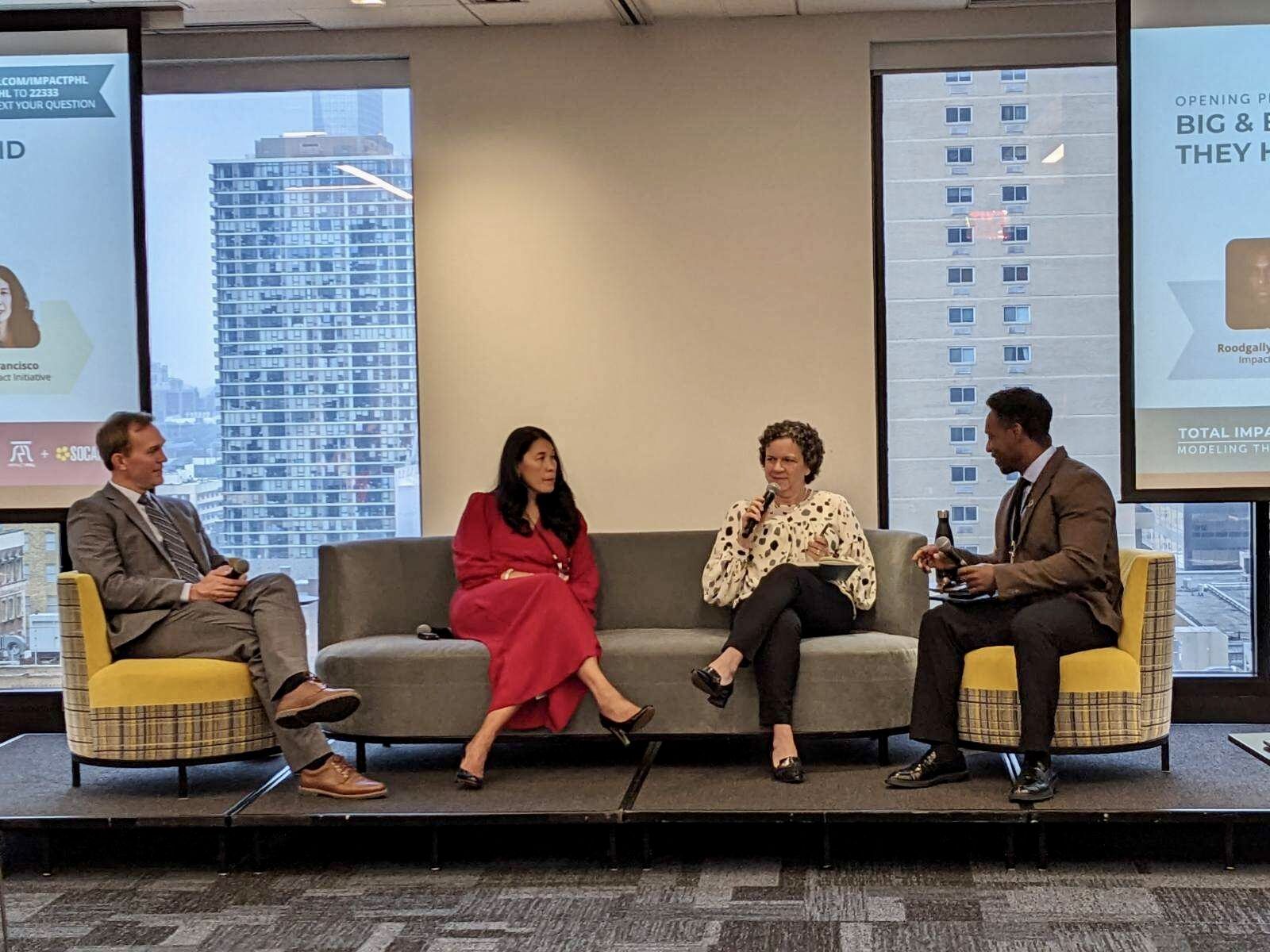Greetings, ImpactAlpha readers!
Ring out the old and ring in some New Year’s impact alpha. ImpactAlpha has assembled the strongest signals, biggest deals and most provocative takeaways of the year to get you off to a strong start in 2019. Join us for Agents of Impact Call No. 6, Thursday, Dec. 20th at 9:00 am PT/ 12:00 pm ET/ 5:00 pm GMT. RSVP today.
Featured: Impact Voices
Impact fintechs need private debt, not just private equity, to fuel their social mission. Financial technology companies serving underbanked populations in developing markets are ready to scale. They don’t need private equity. They need private debt to provide liquidity for loan-making. “The more impact investors embrace private debt as a catalyst for scale, the more fintech companies will succeed in their mission to promote financial inclusion across developing and frontier markets,” writes Microvest’s John Beckham in a guest post on ImpactAlpha.
Impact investors may be nervous about the ability of fintech companies to accurately underwrite loans to individuals or businesses in developing markets. For many fintechs, however, the opposite is true, Beckham says. Many financial technology companies use technology to more efficiently deploy tried and true underwriting methods. Short-duration loans mean that balance-sheet risks are better managed than most people realize. Zambia-based Zoona’s agent network across southern Africa enables more than a million individuals to make electronic payments without trekking to distant bank branches. “For Zoona and other first-generation impact fintechs, the business model has been proven. The technology and infrastructure are in place,” Beckham writes. “To bridge the divide between the underbanked and low-cost financial products, they need the financial capacity to expand their services and their user base.”
Keep reading, “Impact fintechs need private debt, not private equity, to fuel their social mission,” by Microvest’s John Beckham on ImpactAlpha.
Dealflow: Follow the Money
KKR makes first “global impact” investment in Singapore’s Barghest Building Performance. The private-equity giant made the S$45 million (US$33 million) investment even before it has closed its impact investment fund (see, “What we know about KKR’s $1 billion Global Impact Fund”). Barghest Building Performance claims to provide equivalent cooling with 40% less energy than conventional approaches, and offers services via subscription, eliminating upfront capital costs. The Series B funding will help BBP expand from India, China and Taiwan to the Philippines and other markets. Robert Antablin and Ken Mehlman, co-heads of KKR Global Impact, said BBP targets Sustainable Development Goal No. 7 (affordable and clean energy) and No. 9 (industrial innovation and infrastructure). “BBP’s motivation, as is ours, is to achieve meaningful and sustainable costs savings for customers directly alongside long-term and measurable environmental impacts for society,” they said in a statement. Here’s more.
World’s poorest countries to get dedicated impact fund. A new fund built by Bamboo Capital and the U.N. Capital Development Fund aims to increase the flow of impact capital to the world’s 47 lowest-income countries (see “How to attract private capital to the poorest countries”). Least-developed countries, which account for more than one-third of the world’s extreme poor, also are least resilient to economic and environmental shocks and most dependent on shrinking international aid. Bamboo and UNCDF are seeking concessional and commercial capital to invest in small businesses, financial services and infrastructure. Blending finance means “We will be able to take greater risks,” says Bamboo’s Capital’s Jean-Philippe de Schrevel. Here’s what we know.
Omidyar Network backs Brazil’s Agenda Edu. Sao Paulo-based Agenda Edu makes software to improve communication between teachers, parents and students in Brazil’s education system. The four-year-old company helps more than 1,350 Brazilian schools manage student attendance, tuition collection, events, news and photos. Omidyar Network invested an undisclosed sum in the company and was joined by Bossa Nova Investimentos, a pre-seed Brazilian venture capital firm. Learn more.
Signals: Ahead of the Curve
‘The devil’s in the details’ in new U.S. commitments to Opportunity Zones. An executive order by President Trump creates a White House council to coordinate Opportunity Zone support from 13 federal agencies. That could include grant funding, loan guarantees, infrastructure spending and crime prevention initiatives.
- Action items. The agencies have prepared a list of more than 150 actions to support investments in the zones, including water infrastructure and rural broadband spending, loan programs in designated tracts and mentoring and gang-prevention initiatives, The New York Times reports. An administration official said a new round of Opportunity Zone and fund regulations would include reporting requirements to “allow economists to evaluate whether the program is having an impact.”
- Agents of impact reaction. “What I fear is if this means federal disinvestment in the non-selected tracts, many of which are also areas that need to attract support,” tweeted Beth Bafford of Calvert Impact Capital… Beeck Center’s Sonal Shah called for “a directive to measure impact and/or have intentionality towards impact (e.g # of long term jobs). It has to be more than a tax break.”… Enterprise’s Rachel Reilly is encouraged by the mentions of data collection and coordination. “Devil’s in the details around the 150 actions,” she told ImpactAlpha… Develop’s Steve Glickman applauded “more holistic public-private approaches to rebuilding communities.” The administration is “on the hook for making OZs far more accessible for business investors,” he told us. Watch for the administration’s Opportunity Zone tour, and new regulations in January.
- Share this post.
Sankalp Global Summit targets next three billion emerging consumers. India, soon to be the most populous country in the world, also has the most people without access to safe water, and hundreds of millions of people without toilets, electricity, or bank accounts. “In the next five decades we will see more urbanization than any country has ever seen,” said Amitabh Kant of the National Institution for Transforming India, at this week’s 10th Annual Sankalp Global Summit in Mumbai. If India can tackle the social issues of urbanization, Kant said, “then we are finding solutions to the seven billion people of the world.”
Sankalp, produced by the Aavishkaar-Intellecap Group, convened 800 impact entrepreneurs, investors and others around the theme was the building of an entrepreneurial ecosystem that supports economic inclusion and opportunity for the world’s three billion emerging consumers. Among the highlights:
- Sankalp Awards. This year’s winners include YCook, a food company that raised $5 million to support productivity and sustainability practices of farmers in its supply chain; Frontier Markets, a clean energy distribution company; ftcash, a digital payments and lending company; and Simulanis, an education and workforce training startup that recently raised funding from Village Capital and CBA Capital. The pitch competition has helped 30 social entrepreneurs raise $120 million in venture funding.
- Large is beautiful, too. Startups like Farm Taaza, FarmFolks, and Doodhwala have raised financing to improve agriculture supply chains and farmers’ access to markets. Origo and Samunnati are improving smallholder farmers’ access to financing. Ventures like AgNext and Stellapps are driving data and digital integration in the sector. India’s agriculture sector, which provides livelihoods for more than half of the population, is ripe for disruption by startups. Improving farmers’ productivity and income requires buy-in from large agribusinesses as well, says Omnivore Capital’s Mark Kahn. “It’s difficult for startups to reach small, marginal farmers directly. Large businesses are the channel to reach farmers.”
- Credit through a gender lens. Women in India face a $287 billion credit gap. Seedfund Advisors’ Paula Mariwala said women’s dedication and willingness to take risks should spur investors and financial institutions to close that gap. “This is something that we can bank on.”
- Share this post.
Agents of Impact: Follow the Talent
Uncharted seeks a director of operations in Denver… Social Finance US is recruiting a senior researcher for its ‘impact-weighted accounts’ initiative… Social Finance UK is looking for a director of its social finance accelerator… Rethink Education is hiring a VC analyst.
— December 13, 2018.











